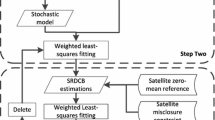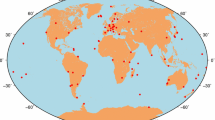Abstract
The flex power technology of satellite navigation systems can improve the anti-jamming ability of navigation signals, but the flex power technology may have many effects in navigation and positioning. In this paper, the effects of the BeiDou Navigation Satellite System (BDS) flex power on differential code biases (DCBs) estimation and precise point positioning (PPP) convergence were researched. First, the variation characteristics of the carrier-to-noise density ratio and daily DCB products during BDS flex power active periods were analyzed. Then, the influence of BDS flex power on DCB estimation was examined by different DCB estimation strategies. Finally, the convergence performance of PPP algorithms using different DCB corrections during BDS flex power active periods was investigated. Results show the B3I signals of the BDS-2 Geostationary Orbit (GEO), Medium Earth Orbit (MEO), and Inclined Geosynchronous Orbit (IGSO) satellites have the capability of flex power. The BDS observation data during flex power events that occurred on DOY 029 in 2021 were analyzed. Estimates derived from reference satellite constraint indicate that the DCB of the satellites without flex power activated did not change, whereas the DCB of the IGSO satellites with flex power activated increased by 10–15 ns. When the flex power was activated at part of the DOY 029, 2021, the correction of daily DCB products resulted in the extension of BDS PPP convergence time for most stations within the flex power coverage area, regardless of whether the flex power was activated; however, the convergence time of PPP was unaffected if the station was outside the flex power coverage area.















Similar content being viewed by others
Data availability
The GNSS datasets analyzed during the current study are available from ftp://cddis.gsfc.nasa.gov/pub/.
References
Cui J (2022) Study on estimation and time-varying characteristics of GNSS differential biases. In: Shanghai Astronomical Observatory, Chinese Academy of Sciences
Dai P, Xing J, Ge Y, Yang X, Qin W, Dong Y, Zhang Z (2021) The effect of BDS-3 time group delay and differential code bias corrections on positioning. Appl Sci 11:104
Esenbuğa ÖG, Hauschild A (2020) Impact of flex power on GPS Block IIF differential code biases. GPS Solut 24:91
Esenbuga ÖG, Hauschild A, Steigenberger P (2020) Impact of GPS flex power on differential code bias estimation for block IIR-M and IIF Satellites. In: Proceedings of the 33rd International Technical Meeting of the Satellite Division of The Institute of Navigation (ION GNSS+ 2020) [C]
Esenbuğa ÖG, Hauschild A, Steigenberger P (2023) Recent flex power changes. GPS Solut 27:104
Ge Y, Zhou F, Sun B, Wang S, Shi B (2017) The impact of satellite time group delay and inter-frequency differential code bias corrections on multi-GNSS combined positioning. Sensors (basel) 17(3):602
Guo F, Zhang X, Wang J (2015) Timing group delay and differential code bias corrections for BeiDou positioning. J Geodesy 89:427–445
Jiménez-Baños D, Perello-Gisbert JV, Crisci M (2010) The measured effects of GPS flex power capability collected on sensor station data. In: 2010 5th ESA Workshop on Satellite Navigation Technologies and European Workshop on GNSS Signals and Signal Processing (NAVITEC)
Li M, Yuan Y, Wang N, Liu T, Chen Y (2018) Estimation and analysis of the short-term variations of multi-GNSS receiver differential code biases using global ionosphere maps. J Geodesy 92:889–903
Li W, Jiao W, Wang K, Qiu R, Sun S (2022) Monitoring and analysis on GPS P(Y) code power enhancement. J B Univ Aeronaut Astronaut 48(11):2193–2203
Montenbruck O, Hauschild A, Steigenberger P (2014) Differential code bias estimation using multi-GNSS observations and global ionosphere maps. J Inst Navig 61(3):191–201
Mou Y, Luo X, Xie Z, Peng X (2023) Performance analysis of four PPP service software under different intensity geomagnetic storms. Adv Space Res 72(5):1593–1604
Ren X, Chen J, Li X, Zhang X (2020) Multi-GNSS contributions to differential code biases determination and regional ionospheric modeling in China. Adv Space Res 65(1):221–234
Steigenberger P, Thölert S, Montenbruck O (2019) Flex power on GPS Block IIR-M and IIF. GPS Solut 23:8
Su K, Jiao G (2023) Estimation of BDS pseudorange biases with high temporal resolution: feasibility, affecting factors, and necessity. Satel Navig 4:17
Tang X, Yuan M, Wang F (2022) Analysis of GPS P(Y) signal power enhancement based on the observations with a semi-codeless receiver. Satel Navig 3:26
Wang N, Yuan Y, Li Z, Montenbruck O, Tan B (2016) Determination of differential code biases with multi-GNSS observations. J Geodesy 90(3):209–228
Wang T, Ruf CS, Gleason S, O’Brien AJ, McKague DS, Block BP, Russel A (2022) Dynamic calibration of GPS effective isotropic radiated power for GNSS-reflectometry earth remote sensing. IEEE Trans Geosci Remote Sens 60:1–12
Xiang Y, Xu Z, Gao Y, Yu W (2020) Understanding long-term variations in GPS differential code biases. GPS Solut 24:118
Yang X, Liu W, Huang J, Xiao W, Wang F (2022) Real-time monitoring of GPS flex power based on machine learning. GPS Solut 26:73
Zhong J, Lei J, Dou X, Yue X (2015) Is the long-term variation of the estimated GPS differential code biases associated with ionospheric variability? GPS Solut 20:313–319
Zhou F (2018) Theory and Methodology of Multi-GNSS Undifferenced Uconmbined Precise Point Positioning. In: East China Normal University
Zhou F, Dong D, Li P, Li X, Schuh H (2019) Influence of stochastic modeling for inter-system biases on multi-GNSS undifferenced and uncombined precise point positioning. GPS Solut 23:1–13
Acknowledgements
We acknowledge CAS and DLR for providing DCB products (https://cddis.nasa.gov/archive/gnss/products/bias). We acknowledge IGS for providing the station data (https://cddis.nasa.gov/archive/gnss). We are grateful to the reviewers for their assistance in evaluating this paper.
Author information
Authors and Affiliations
Contributions
ZW and SL contributed to the conception of the study. WZ and SL contributed significantly to the data analysis and manuscript preparation. HW and MJ wrote part of the manuscript. PM and SX contributed to some data analysis work.
Corresponding author
Ethics declarations
Competing interests
The authors declare no competing interests.
Additional information
Publisher's Note
Springer Nature remains neutral with regard to jurisdictional claims in published maps and institutional affiliations.
Rights and permissions
Springer Nature or its licensor (e.g. a society or other partner) holds exclusive rights to this article under a publishing agreement with the author(s) or other rightsholder(s); author self-archiving of the accepted manuscript version of this article is solely governed by the terms of such publishing agreement and applicable law.
About this article
Cite this article
Wu, Z., Li, S., Wan, H. et al. Effects of BDS flex power on DCB estimation and PPP convergence. GPS Solut 28, 41 (2024). https://doi.org/10.1007/s10291-023-01581-8
Received:
Accepted:
Published:
DOI: https://doi.org/10.1007/s10291-023-01581-8




